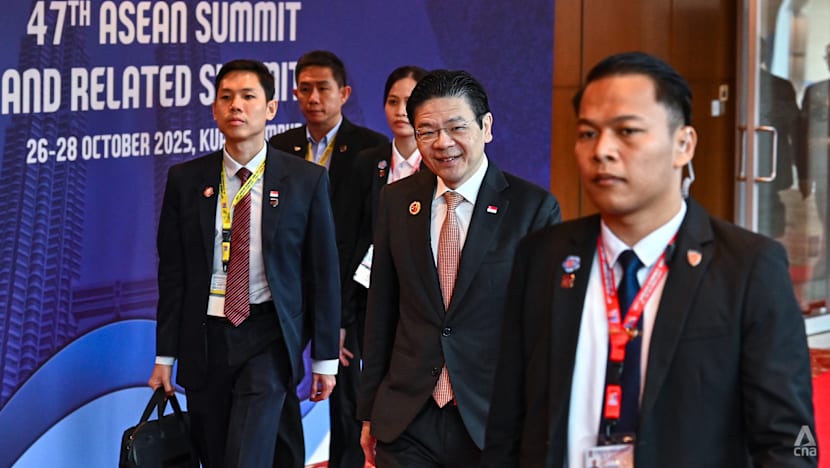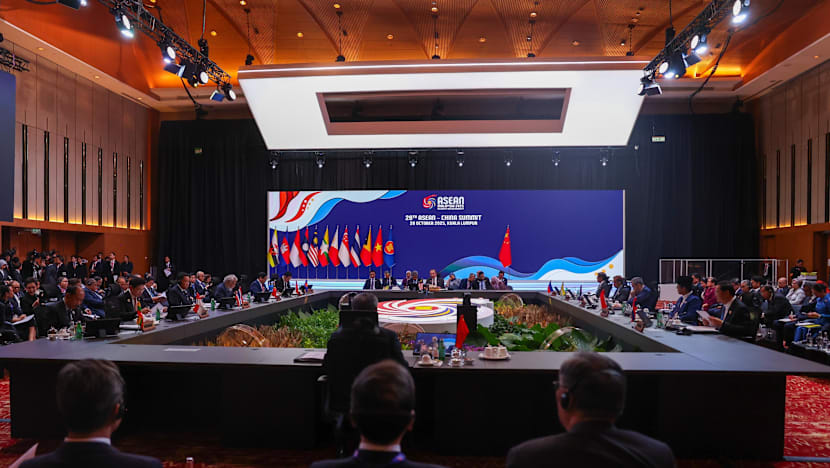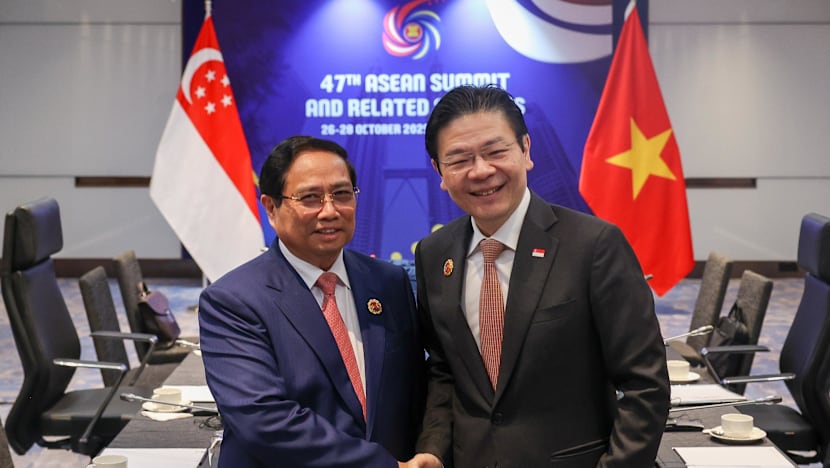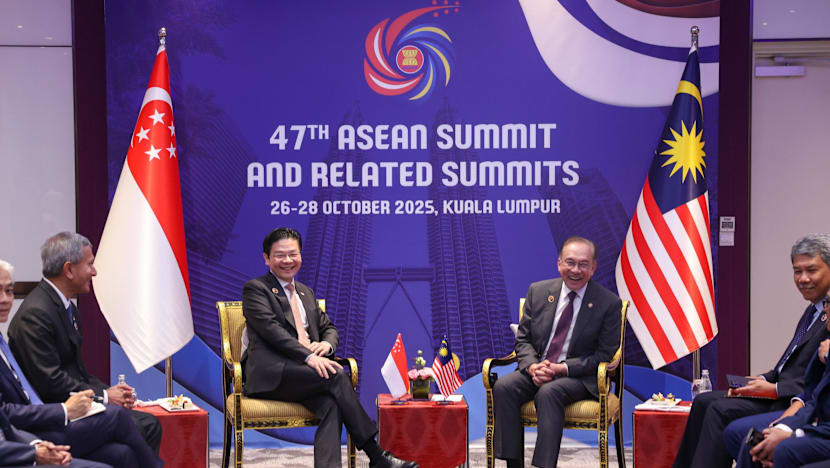ASEAN-China free trade upgrade should be ratified swiftly: PM Wong
Beyond trade, cooperation between ASEAN and China can also be stepped up in areas such as connectivity and the green economy, says Singapore Prime Minister Lawrence Wong.

Singapore Prime Minister Lawrence Wong at the ASEAN Summit in Kuala Lumpur on Oct 28, 2025. (Photo: Â鶹/Zamzahuri Abas)

This audio is generated by an AI tool.
KUALA LUMPUR: Southeast Asian and Chinese leaders should move swiftly to ratify an upgraded free trade agreement signed on Tuesday (Oct 28) so businesses and citizens can begin reaping its benefits, said Singapore Prime Minister Lawrence Wong.
Speaking at the Association of Southeast Asian Nations (ASEAN) and China summit in Kuala Lumpur, Mr Wong said that effective implementation of the deal would unlock new economic opportunities across the region.
The ASEAN-China Free Trade Area (ACFTA), first signed in 2002 and entered into force in 2010, was China’s first free trade pact and ASEAN’s first with a major external partner. It was upgraded to version 2.0 in 2019 with a streamlining of trade rules.
Talks on the so-called 3.0 upgrade began in 2022 and ended in May to broaden the agreement’s scope to emerging areas, such as digital and green economies, as well as supply chain connectivity.
It also introduces new commitments against unfair or anti-competitive business practices to provide better protection for online and overseas consumers, said a press release from Singapore’s Ministry of Trade and Industry (MTI) on Tuesday.
Since 2010, trade between ASEAN and China has expanded more than 220 per cent.
China is ASEAN’s largest trading partner and third-largest source of foreign direct investment. In 2024, ASEAN-China trade reached US$777.2 billion (S$1 trillion), while Chinese foreign direct investment in the region stood at US$19.3 billion, according to figures from MTI.
ASEAN’s top traded products with China include electrical machinery, mechanical appliances, mineral fuels and oils, medical and optical instruments, as well as natural and cultured pearls.
“The upgrade will further reduce trade barriers, strengthen supply chain connectivity and unlock opportunities in future growth areas,” said Mr Wong, calling the agreement a "significant achievement".
Related:
Describing the ASEAN-China relationship as “one of ASEAN’s most substantive”, Mr Wong urged both sides to deepen cooperation beyond trade.
On connectivity, he advocated for progressive liberalisation of the ASEAN-China Air Transport Agreement and smoother cross-border commercial data flows to support digital commerce.
In the green economy, Mr Wong highlighted the potential of the ASEAN Power Grid, an initiative to link up electricity systems across the region, to improve energy resilience and create new economic opportunities.
China, the world’s largest producer of renewable energy, could contribute its technical expertise. Singapore will also do its part to support sustainable development in the region, including through its Third Country Training Programme with China, said Mr Wong.
“These areas align with the four priorities of the ASEAN Outlook on the Indo-Pacific (AOIP),” he said, urging ASEAN and China to continue implementing the AOIP “in tangible ways”.
The AOIP promotes cooperation across four pillars: maritime cooperation, connectivity, the UN Sustainable Development Goals 2030 and economic collaboration.

Mr Wong said concrete cooperation builds “confidence and trust, which is necessary for managing issues like the South China Sea”.
“Inevitably, there will be differences of views around the South China Sea, but all of us agree that peace, stability, safety and freedom of navigation and overflight, are critical in this important waterway,” he added.
“We should redouble our efforts to achieve a substantive and effective Code of Conduct which is in accordance with international law, including the 1982 UNCLOS (United Nations Convention on the Law of the Sea), and which safeguards the rights and interests of all parties in the South China Sea.”
ASEAN and China will mark 35 years of dialogue relations in 2026, as well as five years of comprehensive strategic partnership.
“I am confident that if ASEAN and China continue to redouble our efforts on cooperation, we can continue to drive sustainable and inclusive growth in our region and deliver lasting benefits to all our peoples,” he said.
The final day of the 47th ASEAN summit also saw regional leaders in closed-door meetings with their counterparts from New Zealand and Australia.
With New Zealand, ASEAN is upgrading ties to a Comprehensive Strategic Partnership after 50 years of formal dialogue relations.
Mr Wong, in speeches delivered at these meetings, acknowledged the relationships that ASEAN has with these two countries, and called for further cooperation in areas such as the digital economy and the green transition.

Separately, Mr Wong met his Vietnamese counterpart Pham Minh Chinh at the 2nd Singapore-Vietnam Annual Leaders’ Meeting held on the sidelines of the ASEAN summit.
The meeting was their third this year, said Mr Wong, noting that it reflects the “close cooperation and friendship” between the two countries which upgraded ties to a Comprehensive Strategic Partnership in March.
A plan of action was launched on Tuesday, outlining ways for both sides to deepen collaboration in key areas, such as renewable energy, technology and agri-trade, he added in a Facebook post.

Mr Wong also met Malaysian Prime Minister Anwar Ibrahim at the end of the summit, where he congratulated the leader on staging a “very successful” ASEAN Summit and for steering the bloc through “what has been a challenging and eventful year”.
Mr Anwar and Malaysia have enabled ASEAN to take “significant steps forward”, such as the historic expansion to include Timor-Leste, integration efforts ranging from the upgrade of the ASEAN Trade in Goods Agreement to the substantial conclusion of the Digital Economy Framework Agreement, as well as the managing of the border dispute between Cambodia and Thailand, he said during a wrap-up doorstop with the Singapore media at the end of the summit.
At the same time, ASEAN stepped up its engagement with external partners. This went beyond traditional partners like China and the US, to include others who are interested in doing more with ASEAN, such as Canada and the European Union, he added.
“All in all, it has been a very productive year under Malaysia’s chairmanship.”












